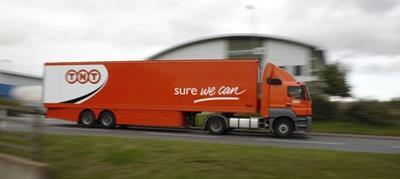
UPS has pulled out of its multi-billion Euro bid to take over TNT Express, almost a year after it first entered into talks with the parcel firm. It hoped the merger would create a €45bn (£37.4bn) logistics giant, increasing the US firm’s presence in the European market.
However on Friday (11 January), the European Commission (EC) told both parties that it planned to prohibit the merger. MT.co.uk looks at how the story developed over the year.
The merger process began in February 2012 when UPS made an initial offering that valued TNT Express at €4.9bn. The offering was rejected by TNT, but in March UPS revealed that it was to bid again for the carrier.
A month after the initial offering was rejected, TNT accepted UPS’s second offer of €9.50 per share, amounting to €5.16bn for the entire firm. According to the Motor Transport Top 100, the deal would have placed the merged entity level with Wincanton as the second largest logistics operator in the UK, with an approximate £1.3bn UK turnover.
After the offer was accepted, UPS then sought to secure funding for the takeover, and in May it announced that it would finance the offer using €3.7bn from its balance sheet and around €1.46bn from using existing credit facilities.
In line with Dutch regulatory requirements, UPS submitted its offer proposal to the EC on 14 May. The firms anticipated the takeover to take place by the end of Q2 2012, if UPS received approval and TNT shareholders accepted the offer.
In June UPS formally submitted its €9.50 per share offer to TNT shareholders, who were given until 31 August to consider the offer, which was recommended by the TNT board.
But in July, UPS revealed that the acquisition would be delayed as it was undertaking a “Phase II review” of the planned acquisition, since there were “certain areas that require[d] more time to analyse”, according to the firm. This extended the offer period to Q4 2012, beyond the former 31 August deadline.
A week later, the European Commission revealed the first of its concerns with the planned merger. It stated that the resulting company would lower the number of small parcel carriers that operate road and air networks from four to three, therefore reducing the competition it would receive from the other two operators, DHL and FedEx.
In August, the process was stalled further when TNT announced that it the regulator had temporarily suspended the merger bid to allow it to compile more information. Despite this, the firms were still optimistic that the deal would close by the end of 2012 and the offer period was extended until 9 November. A month later, the acquisition was delayed again, pushing the estimated completion date to early 2013.
There was more bad news for TNT in September when chief executive Marie-Christine Lombard resigned, handing over her responsibilities to CFO Bernard Bot, who is now acting as interim chief executive.
After voicing its concerns in August, the EC finally issued a formal statement of objections in October, addressing the competitive impact the proposed merger would have on the small parcels market in Europe. In a statement, UPS said: “[We] believe competition in Europe continues to be significant, coming from multiple players who offer similar services”.
The regulator again echoed its concerns at the beginning of November, saying that “substantial remedies” were needed in order for UPS to obtain competition clearance. Despite this, the regulator or either parcel firm did not reveal the nature of what the EC required.
At the end of November, UPS submitted the steps it would take to remedy the competition concerns raised by the EC. The nature of these remedies were not revealed, but in a statement, UPS said that it involved the sale of its business activities and assets.
These were market-tested by the EC to gain approval, however the parcel firms today announced that they would not receive clearance from the regulator.














